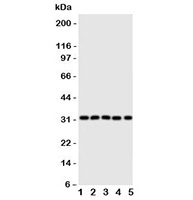- Tel: 858.663.9055
 Email: info@nsjbio.com
Email: info@nsjbio.com
- Tel: 858.663.9055
- Email: info@nsjbio.com
AQP9 Antibody reagents target aquaporin 9, a multifunctional aquaglyceroporin expressed in hepatocytes, immune cells, and select neuronal populations. Unlike water-selective aquaporins, AQP9 facilitates transport of glycerol, urea, lactate, and small solutes, in addition to water. This dual transport capacity positions AQP9 at the intersection of energy metabolism and cellular hydration.
In the liver, AQP9 is highly expressed at the sinusoidal membrane of hepatocytes, where it mediates glycerol uptake for gluconeogenesis and lipid metabolism. AQP9 also contributes to immune cell function by regulating solute permeability during activation and migration. Emerging evidence links altered AQP9 expression to metabolic syndrome, insulin resistance, nonalcoholic fatty liver disease (NAFLD), and certain cancers. Because of its wide physiological footprint, the AQP9 Antibody is an indispensable reagent for metabolism, hepatology, and immunology research. The Aquaporin 9 Antibody complements these studies with validated reagents for multi-assay compatibility.
NSJ Bioreagents provides AQP9 Antibodies validated for immunohistochemistry, western blotting, immunofluorescence, ELISA, and flow cytometry. Each AQP9 Antibody undergoes extensive validation for specificity, reproducibility, and cross-platform performance.
By choosing AQP9 Antibodies from NSJ Bioreagents, researchers gain reagents optimized for clarity and reliability. Our antibodies consistently deliver strong signals in liver sections, immune cell assays, and lysate preparations. With comprehensive datasheets, validated controls, and optimized protocols, the AQP9 Antibody ensures reproducibility across discovery and translational pipelines.
The AQP9 Antibody supports wide-ranging applications across metabolism, hepatology, immunology, and translational medicine.
AQP9 Antibodies detect sinusoidal AQP9 in hepatocytes.
The AQP9 Antibody supports studies of gluconeogenesis, glycerol uptake, and lipid metabolism.
Aquaporin 9 Antibody reagents validate biomarkers for NAFLD and metabolic syndrome.
AQP9 Antibodies reveal expression in leukocytes, linking aquaporin biology to immune regulation.
The AQP9 Antibody supports studies of leukocyte migration and activation.
Aquaporin 9 Antibody reagents provide insights into immune–metabolic cross-talk.
AQP9 Antibodies detect expression in select neuronal and glial populations.
The AQP9 Antibody supports studies of neuroenergetics and lactate transport.
Aquaporin 9 Antibody reagents contribute to models of brain injury and neurodegeneration.
AQP9 Antibodies identify altered expression in hepatocellular carcinoma and leukemia.
The AQP9 Antibody supports studies of cell survival, proliferation, and metabolic reprogramming.
Aquaporin 9 Antibody reagents extend applications into biomarker discovery for cancer.
AQP9 Antibodies clarify roles in systemic energy regulation.
The AQP9 Antibody supports studies of insulin resistance and obesity.
Aquaporin 9 Antibody reagents validate biomarkers in metabolic disease research.
AQP9 Antibodies are integrated into biomarker-driven hepatology and metabolic studies.
The AQP9 Antibody supports diagnostics for liver disease and diabetes.
Aquaporin 9 Antibody reagents ensure reproducibility in translational pipelines.
AQP9 is a multifunctional aquaglyceroporin bridging water transport and solute metabolism. The AQP9 Antibody equips researchers with validated tools for studying hepatocyte biology, immunometabolism, and translational pathology, while the Aquaporin 9 Antibody provides broader compatibility across research and clinical workflows.
In liver research, AQP9 Antibodies clarify mechanisms of glycerol uptake and gluconeogenesis. In immunology, the AQP9 Antibody supports studies of leukocyte migration and solute regulation. In oncology, Aquaporin 9 Antibody reagents highlight altered expression in cancer biology.
Clinically, AQP9 is emerging as a biomarker for NAFLD, metabolic syndrome, and cancer. Reliable AQP9 Antibodies ensure reproducibility and accuracy, bridging basic biology with translational medicine.
AQP9 integrates solute transport with energy metabolism, impacting liver biology, immune regulation, and disease progression. The AQP9 Antibody provides validated reagents for hepatology, immunology, and oncology, while the Aquaporin 9 Antibody expands these applications into diagnostics and translational research. By ensuring specificity, reproducibility, and assay versatility, these antibodies remain indispensable for advancing aquaporin biology and improving outcomes in liver and metabolic health.

Western blot testing of AQP9 antibody (cat # R31206) and Lane 1: mouse liver; 2: (m) lung; 3: (m) spleen; 4: (m) testis; 5: rat PC-12 lysate. Predicted molecular weight ~32 kDa.